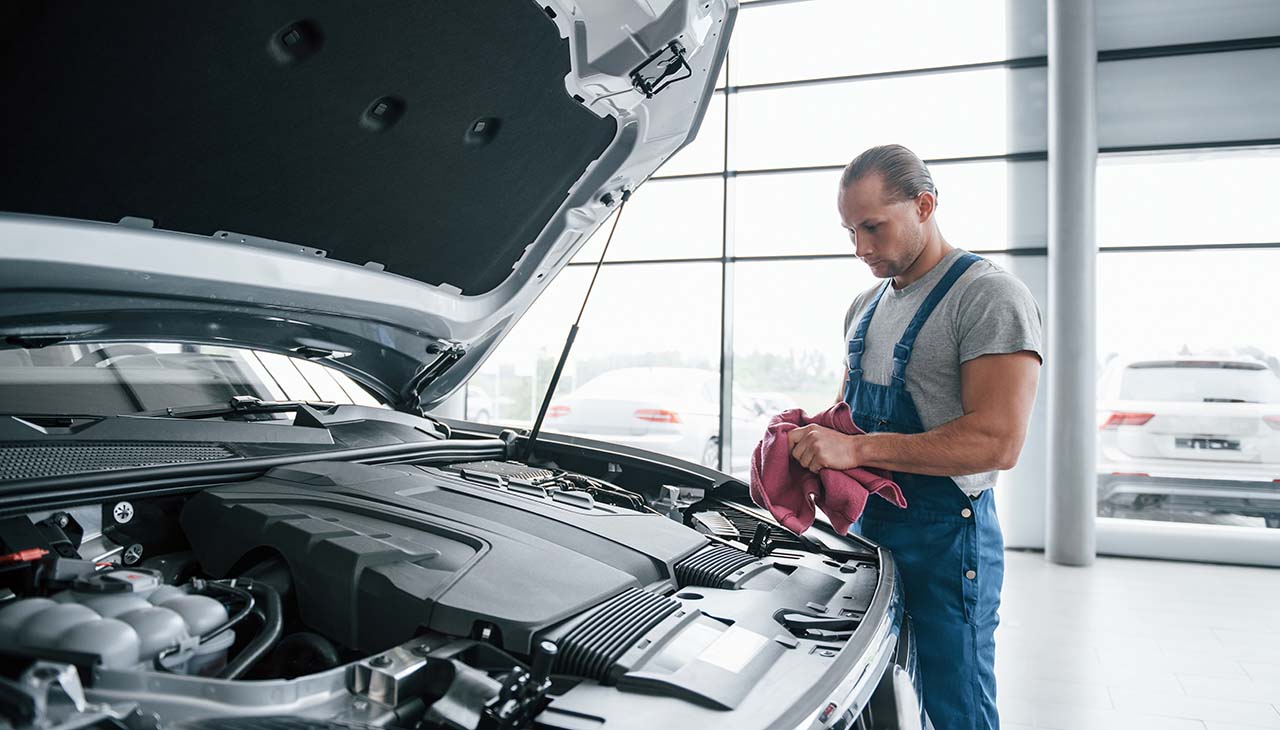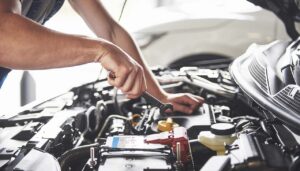
Concentrating at work. Man in blue uniform works with broken car. Making repairings.
Owning a car is a significant milestone that comes with its own set of responsibilities. Among these, understanding and performing basic car maintenance is crucial for ensuring the longevity and optimal performance of your vehicle. Regular maintenance not only prevents unexpected breakdowns and costly repairs but also ensures your safety and that of others on the road. This guide will introduce you to fundamental car maintenance tips that every car owner should be aware of, helping you keep your vehicle running smoothly and efficiently.
Regular Fluid Checks
Engine Oil
Engine oil is the lifeblood of your car, ensuring the smooth operation of the engine by lubricating its moving parts and preventing excessive wear. Check the oil level monthly and change it according to your manufacturer’s recommendation. Waiting too long to change the oil can result in poor engine performance, higher fuel consumption, and severe engine damage.
Transmission Fluid
Transmission fluid plays a critical role in cooling and lubricating the moving parts inside your car’s transmission. A low or deteriorated transmission fluid level can lead to shifting problems, overheating, and can even cause total transmission failure. Check it regularly to ensure your transmission operates smoothly.
Coolant
Coolant helps maintain your engine’s temperature, preventing it from overheating. It’s essential to check the coolant level in the reservoir and ensure it is within the recommended levels. Also, be sure to flush and replace the coolant as advised by your vehicle’s maintenance schedule.
Brake Fluid
Brake fluid is a hydraulic fluid that is crucial for the effective operation of your car’s braking system. Low or contaminated brake fluid can lead to reduced braking power and increased stopping distances. Check the brake fluid level periodically and replace it as needed to ensure your brakes remain responsive and reliable.
Tire Care
Checking Tire Pressure
Regularly checking tire pressure is essential for vehicle safety, fuel efficiency, and tire longevity. Under-inflated tires can lead to increased fuel consumption and faster tire wear, while over-inflation can compromise grip and handling. Use a reliable tire gauge to check the pressure against your vehicle’s recommended settings, usually found on the door jamb or in the owner’s manual.
Tire Rotation
Tire rotation involves changing the position of your car’s tires, from front to back or side to side, to ensure even tire wear. This practice extends the life of your tires, promotes balanced handling, and improves traction. Most manufacturers recommend tire rotation every 5,000 to 7,500 miles.
Tread Wear Inspection
Inspecting tire tread wear regularly helps identify alignment issues and tire damage. Tires with uneven tread wear can affect the vehicle’s handling and increase the risk of accidents. Use the “penny test” – placing a penny into the tread with Lincoln’s head down. If you can see the top of Lincoln’s head, it’s time for new tires.
Importance of Proper Alignment
Proper wheel alignment is crucial for the safety, handling, and lifespan of your tires. Misalignment can cause uneven tire wear, poor vehicle handling, and an increase in fuel consumption. If you notice your car pulling to one side, or if you’ve hit a significant pothole recently, it may be time to have your alignment checked by a professional.
Battery Maintenance
Maintaining your car’s battery is vital for ensuring reliable starts and avoiding unexpected breakdowns. Here are the key aspects of battery maintenance:
Checking Battery Terminals
Regularly check the battery terminals for any signs of corrosion, which can appear as a white, blue, or greenish powdery substance. Loose or corroded terminals can lead to poor electrical connection, making it difficult to start your car. Tighten any loose connections and clean off corrosion with a wire brush.
Cleaning and Corrosion Prevention
To clean the battery terminals, remove the cables (starting with the negative), and use a mixture of baking soda and water to neutralize the corrosion. After cleaning, rinse with water and dry thoroughly. Applying a thin layer of petroleum jelly on the terminals can help prevent future corrosion.
Testing Battery Health
Your car battery’s condition is critical for proper vehicle operation. Most batteries last between 3 to 5 years, but regular testing can help identify issues before they result in failure. You can test your battery’s voltage using a multimeter or have it tested at a service center. A healthy battery should have a voltage of around 12.6 volts when the car is off and slightly higher when the engine is running.
Brakes Inspection
Checking Brake Pads and Rotors
Brake pads and rotors are essential components of your car’s braking system, and checking them regularly for wear and tear is critical. Most brake pads have wear indicators that produce a squealing noise when it’s time for replacement. You should visually inspect the thickness of the brake pads and the condition of the rotors. If the pads are less than 1/4 inch thick or if the rotors are deeply grooved or warped, it’s time to consider replacing them to ensure maximum braking efficiency and safety.
Brake Fluid Level Inspection
Regular inspection of the brake fluid level in the reservoir is vital for maintaining the hydraulic pressure needed for effective braking. If the fluid level is below the minimum mark, it may indicate a leak in the brake system that needs immediate attention. Always use the type of brake fluid specified by your vehicle’s manufacturer when topping up to avoid damage to the system.
Signs of Brake System Issues
There are several signs that could indicate a problem with your vehicle’s brake system. These include a spongy or soft brake pedal, the car pulling to one side when braking, a pulsating brake pedal underfoot, grinding or squealing noises during braking, and an increase in stopping distance. If you experience any of these issues, it’s crucial to have your brakes checked by a professional as soon as possible to avoid compromising your safety and that of others on the road.





